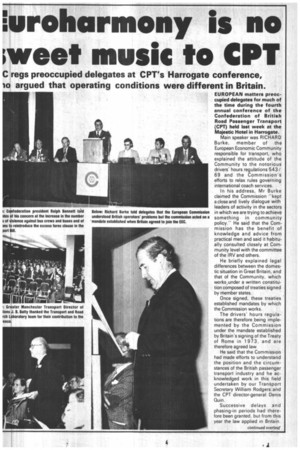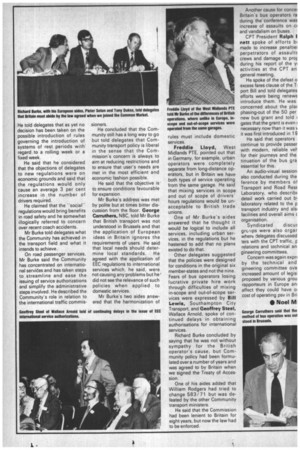roharmony is no eat music to CPT
Page 47

Page 48

If you've noticed an error in this article please click here to report it so we can fix it.
C regs preoccupied delegates at CPT's Harrogate conference, i. argued that operating conditions were different in Britain.
EUROPEAN matters preoccupied delegates for much of the time during the fourth annual conference of the Confederation of British Road Passenger Transport (CPT) held last week at the Majestic Hotel in Harrogate.
Main speaker was RICHARD Burke, member of the European Economic Community responsible for transport, who explained the attitude of the Community to the notorious drivers' hours regulations 543/ 69 and the Commission's efforts to relax rules governing international coach services.
In his address, Mr Burke claimed the Commission "kept a close and lively dialogue with leaders of activity in the sectors in which we are trying to achieve something in community policy." He said that the Commission has the benefit of knowledge and advice from practical men and said it habitually consulted closely at Community level with the committee of the IRV and others.
He briefly explained legal differences between the domestic situation in Great Britain, and that of the Community, which works,under a written constitution composed of treaties signed by member states.
Once signed, these treaties established mandates by which the Commission works.
The drivers' hours regulations are therefore being implemented by the Commission under the mandate established by Britain's signing of the Treaty of Rome in 1973, and are therefore agreed law.
He said that the Commission had made efforts to understand the position and the circumstances of the British passenger transport industry and he acknowledged work in this field undertaken by our Transport Secretary William Rodgers and the CPT director-general Denis Quin.
Successive delays and phasing-in periods had therefore been granted, but from this year the law applied in Britain. He told delegates that as yet no decision has been taken on the possible introduction of rules governing the introduction of systems of rest periods with regard to a rolling week or a fixed week.
He said that he considered that the objections of delegates to new regulations were on economic grounds and said that the regulations would only cause an average 3 per cent increase in the number of drivers required.
He claimed that the "socialregulations would bring benefits in road safety and he somewhat illogically referred to concern over recent coach accidents.
Mr Burke told delegates what the Community has achieved in the transport field and what it intends to achieve.
On road passenger services, Mr Burke said the Community has concentrated on international services and has taken steps to streamline and ease the issuing of service authorizations and simplify the administrative steps involved. He described the Community's role in relation to the international traffic commis sioners.
He concluded that the Community still has a long way to go but told delegates that Community transport policy is liberal in the sense that the Commission's concern is always to aim at reducing restrictions and to ensure that user's needs are met in the most efficient and economic fashion possible.
He said that the objective is, to ensure conditions favourable for expansion.
Mr Burke's address was met by polite but at times bitter discussion from the floor. George Carruthers, NBC, told Mr Burke that British transport was not understood in Brussels and that the application of European ideas in Britain ignores the requirements of users. He said that local needs should determine local standards. He agreed with the application of EEC regulations to international services which, he said, were not causing any problems but he' did not see the relevance of such policies when applied to domestic services.
Mr Burke's two aides answered that the harmonization of rules must include domestic services.
Freddie Lloyd, West Midlands PTE, poirfted out that in Germany, for example, urban operators were completely separate from long-distance operators, but in Britain we have both types of service operating from the same garage. He said that mixing services in scope and out of scope of drivers' hours regulations would be unacceptable to British trade unions.
One of Mr Burke's aides answered that he thought it would be logical to include all services, including urban services, in the regulations but he hastened to add that no plans existed to do that.
Other delegates suggested that the policies were designed for conditions in the original six member-states and not the nine. Fears of bus operators losing lucrative private hire work through difficulties of mixing in-scope and out-of-scope services were expressed by Bill Lewis, Southampton City Transport and Geoffrey Steel, Wallace Arnold, spoke of continued delays in obtaining authorisations for international services.
Richard Burke concluded by saying that he was not without sympathy for the British operator's cause, but Community policy had been formulated over a number of years and was agreed to by Britain when we signed the Treaty of Accession.
One of his aides added that William Rodgers had tried to change 583/71 but was defeated by the other Community transport ministers.
He said that the Commission had been lenient to Britain for eight years, but now the law had to be enforced. Another cause for concei Britain's bus operators ra during the conference was increase of assaults on Cr and vandalism on buses.
CPT President Ralph E nett spoke of efforts bi made to increase penaltie perpetrators of assaults crews and damage to prop during his report of the yi activities at the CPT an general meeting.
He spoke of the defeat o excess fares clause of the Ti port Bill and told delegates efforts were being renewe introduce them. He was concerned about the plar phasing-out of the 50 per new bus grant and told gates that the grant is even necessary now than it was v it was first introduced in 19 He said that operators continue to provide passer with modern, reliable veb for their journeys and the tinuation of the bus gra essential for this.
An audio-visual session also conducted during the ference by members of Transport and Road ResE Laboratory, who describE detail work carried out b■ laboratory related to the p transport industry and els, facilities and overall aims c organisation.
Syndicated discus gro,(ps were also orgar where delegates discussed ters with the CPT traffic, p relations and technical an gineering committees.
Concern was again expr( by the technical and gineering committee ove increased amount of leg isl proposed by various grou rapporteurs in Europe am affect they could have oi cost of operating psv in Bri
• Noel Mi




























































































































